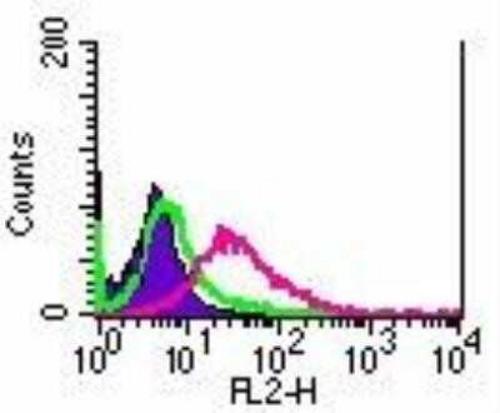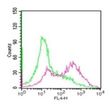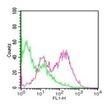RANKL (TNFSF11) Mouse Monoclonal Antibody [Clone ID: 12A380]
USD 436.00
USD 200.00
USD 867.00
Specifications
| Product Data | |
| Clone Name | 12A380 |
| Applications | FC, ICC/IF, IHC, WB |
| Recommended Dilution | Immunohistochemistry: 1:10-1:500, Immunohistochemistry-Paraffin: 1:50 - 1:250, Flow Cytometry: 1:10-1:1000, Western Blot: 4-6 ug/ml, Flow (Cell Surface), Immunohistochemistry-Frozen: 1:10-1:500, Immunocytochemistry/ Immunofluorescence |
| Reactivities | Human, Mouse |
| Host | Mouse |
| Isotype | IgG1, kappa |
| Clonality | Monoclonal |
| Immunogen | A bacterially expressed fusion protein containing amino acid residues 1-317 of mouse TRANCE was used as immunogen. |
| Formulation | PBS containing 0.05% BSA, 0.05% Sodium Azide. Store at 4C short term. Aliquot and store at -20C long term. Avoid freeze-thaw cycles. |
| Concentration | lot specific |
| Purification | Protein G purified |
| Conjugation | Unconjugated |
| Storage | Store at -20°C as received. |
| Stability | Stable for 12 months from date of receipt. |
| Gene Name | tumor necrosis factor superfamily member 11 |
| Database Link | |
| Background | TRANCE/OPGL/RANKL/ODF is a recently identified member of tumor necrosis factor family. TRANCE (TNF-related activation-induced cytokine receptor) or RANKL {receptor activator of NF-kB (RANK) ligand} has been implicated in interactions between T cells and dendritic cells. RANK ligand (RANKL/TRANCE) binds to RANK on dendritic cells, upregulates the expression of anti-apoptotic protein BcL-XL suggesting a role in dendritic cell survival. TRANCE/RANKL is also important in T- and B-cell maturation. As OPGL/ODF (Osteoprotegerin Ligand/Osteoclast differentiation factor), the same protein can both activate mature osteoclasts and mediate osteoclastogenesis. OPGL/TRANCE deficient mice show severe osteoporesis and complete absence of osteoclasts as a result of lack of osteogenesis. |
| Synonyms | CD254; hRANKL2; ODF; OPGL; OPTB2; RANKL; sOdf; TRANCE |
| Note | Flow Cytometry (Surface): please see Yoneda et al. 2004 for details. Immunohistochemistry-Frozen: please see Yoneda et al. 2004 for details. |
| Reference Data | |
| Protein Families | Druggable Genome, Transmembrane |
| Protein Pathways | Cytokine-cytokine receptor interaction |
Documents
| Product Manuals |
| FAQs |
| SDS |
{0} Product Review(s)
Be the first one to submit a review






























































































































































































































































 Germany
Germany
 Japan
Japan
 United Kingdom
United Kingdom
 China
China






